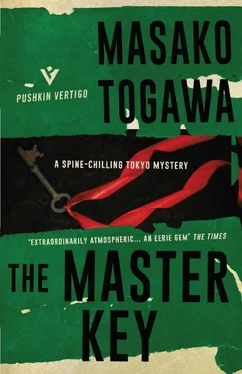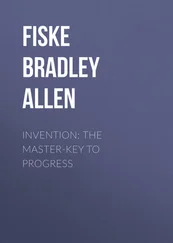And so it wasn’t just habit. There had to be a reason, and Yoneko guessed that Chikako was waiting for a visitor.
Her second hypothesis was based on the fact that Chikako only went out just before lock-up time. There had to be a reason for this, too.
She found the answer to this one quite simply. Miss Tamura told her that Chikako would go out once or twice a week to a nearby late-night drapers and obtain her supplies for the embroidery she did in her apartment to keep body and soul together.
‘You know, she’s so worried about someone calling when she’s out that she even leaves her key in the mail box every time she leaves the building! But no one has visited her for years and years. She’s an odd one, that’s for sure,’ confided the receptionist.
When she heard this, Yoneko wished that Miss Tamura had told the story much sooner, although there was no way she could complain about it to her! Perhaps she need never have stolen the master key and undergone the subsequent tribulations. But then, even if Chikako left the key in her mail box, it was right opposite the receptionists’ desk, and so it would have been no easy task to remove it and replace it without being seen.
She resolved once again to use the master key to get inside Chikako’s room.
As far as the master key was concerned, Yoneko could detect no change in Miss Tojo’s attitude towards her since she had switched the keys under her nose, and so presumed that she was not under any suspicion. Also, since the committee had tried the false master key in every door in the building and it had failed to fit even one lock, there was a general presumption that the key had come from outside, and on this vague basis the matter had been allowed to rest. So Yoneko felt that it would now be quite safe for her to use the master key whenever the opportunity presented itself.
She changed her tactics, and no longer went patrolling around Chikako Ueda’s room on the fifth floor. Instead, she made it her habit to pass by the front door between half-past ten and eleven every night and check up on Chikako’s letter box.
Three days later, her plan worked. She went downstairs to find that Chikako’s tag read ‘Out’.
She looked out of the front door. There was no sign of Chikako. Around the building, the earth excavated for the move lay in damp brown piles around the conveyors, and the air smelled of freshly turned soil. It was time to make her visit.
She hurried back into the building. The tag on Chikako’s box was still moving slightly, so she could not have been gone long. Yoneko hurried to her own room on the fourth floor and collected a torch, a pencil and a notepad. She felt quite calm about what she was going to do. Even if someone saw her going into Chikako’s room, she would act as if it was the most natural thing in the world; the last thing she should do would be to look guilty about it. If she behaved like that, then no one would suspect her. She felt quite courageous and resolute as she climbed the staircase.
She passed a woman in a nightdress in the corridor of the fifth floor. The woman was carrying a toothbrush, and disappeared into the communal washplace. Without letting this disturb her, Yoneko went straight to Chikako Ueda’s door and inserted the key in the lock. There was nobody around, and Yoneko felt how easy it had turned out to be. She stepped inside the darkened room, closed the door, switched on the torch and looked at her watch. It was ten-forty pm. That gave her ten minutes, during which she must complete her search of Chikako Ueda’s room. But what should she concentrate her searches on in that short time?
She swung the torch around the room, focussing the beam on the dusty walls. Obviously the first thing to look for would be a diary. On one side of the room there stood a wardrobe and a chest of drawers. She decided to look inside the drawers.
In the middle of the room there was a low table with a linen towel spread over crockery. It looked like a place setting under the towel, and she lifted it up to find that this was indeed the case, but it was not the kind of setting she had expected in this spinster’s room, for the cup was a large one and the chopsticks were of black lacquer and also large. In short, the place was set for a man and not for a woman.
Beside the setting were a few cans of food, a tin opener and a rice tub.
Yoneko felt a cold shiver run down her back. She was inexplicably frightened by this discovery. In order to confirm her suspicions, she opened the rice tub; as she had guessed, it was empty.
When one lives alone, one gets into the habit of talking to oneself. This gives the illusion that one has a companion, and so helps overcome the feeling of solitude. What Yoneko had now discovered seemed to be more or less the same thing. Chikako Ueda, by making a little ritual of setting out dinner for a visitor every night, was fighting her loneliness. But a meaningless ritual would not have this effect—it had to have some basis of fact upon which the fantasy could be built. Some years before, Chikako must have prepared supper for a man who had gone out and never come back. There could be no other rational explanation and Yoneko was convinced that she had discovered something of import.
Next, she tried the smallest drawers in the chest. One was locked and she did not waste precious time trying to open it. The other was full of old receipts and nothing else.
She went towards the window, where there was a writing desk and a bookcase. She let the torch beam play over the book shelves, but from reading the spines of the books it was clear that they were only old school textbooks. There was a pile of notebooks, covered in dust, on the desk, but these were just children’s exercise books of the type used for setting homework.
On the other side there was a newer looking exercise book. The word Elegies was written on the title page. There then followed two pages of translations from foreign poets; all the works were of sufficient fame for Yoneko to be familiar with them. On the third page, no author’s name appeared, but there was a poem entitled ‘To a child buried on 29 March’. Yoneko felt that this might prove to be of more interest to her, because of the date and the reference to a child, so she read the whole poem:
TO A CHILD BURIED ON 29 MARCH
We
Buried you
In the bed
Of a dried-up lake
We laid you to rest for ever…
But
The dried bed
Cracked, and sometimes
The sound of your tears
Leaks through and we can hear you…
Why
Did not the merciful heavens
Sprinkle rain at least once upon your dust?
Rain… like the tears of your bereaved mother…
Plainly, the child described in the poem was George, who had been kidnapped from his mother Keiko Kawauchi. Yoneko was certain of this. There was nothing else written in the book. She read the poem once again and tried to learn it by heart, and this time it just seemed like any other poem to her, but she was sure her first impression was right. She wrote down the title in her notepad and got up to go. There was nothing else for her to see.
She switched off the electric torch and closed her eyes. The dull thuds of the work going on outside echoed in her ears—it was time to be gone. She would have plenty of time for thought later.
She turned on the torch again, and looked at the notebook. The beam rested on the title— Elegies . She turned to go, and the torch beam, moving with her body, suddenly picked out something bright on the window pane—it was as if a light was being shone inwards at her. She really did not have any more time to spare, but nonetheless she went over to examine this new discovery. It turned out to be the sort of mirror that small boys use to dazzle people in the rays of the sun. What could it all mean?
Читать дальше












